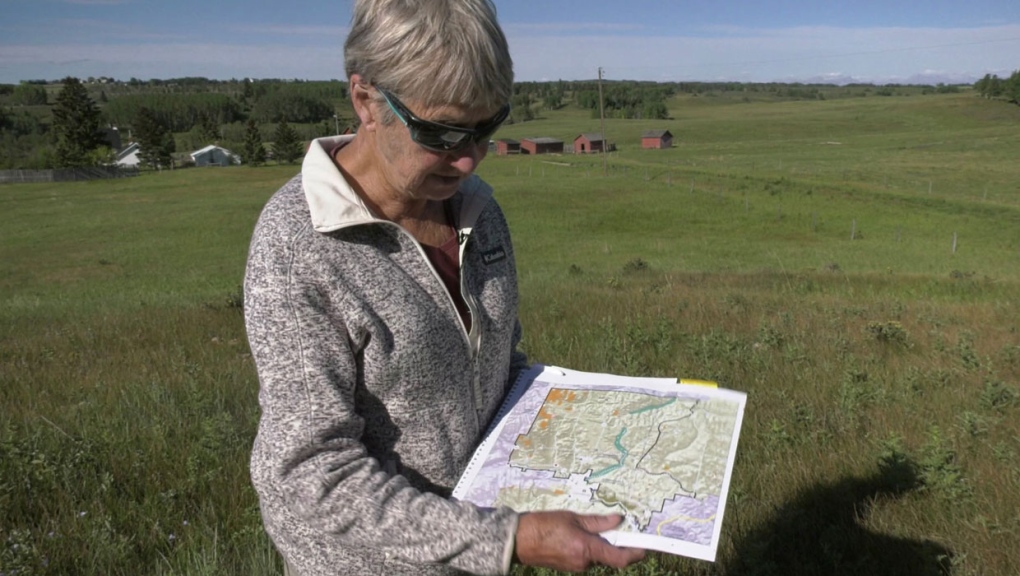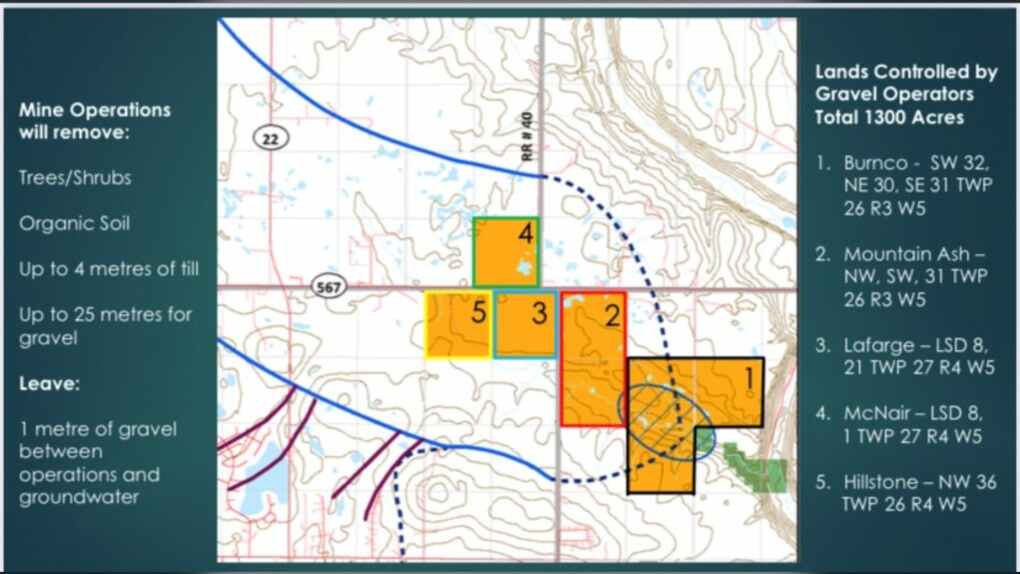Preservation society calls on Alberta government to rethink approval of gravel pit near Big Hill Springs Provincial Park
Alberta’s UCP government has given its approval for a gravel company to start mining up against Big Hill Springs Provincial Park, but members of the local preservation society are pointing to major environmental concerns.
Mountain Ash Ltd. received approval from the province on July 20, which would grant the company permission to mine its 130-hectare Summit Project open pit operation located northeast of Cochrane at the corner of Highway 567 and Range Road 40.
Approvals were also granted from Rocky View Council to develop the 30 to 40 year gravel operation.
The Bighill Creek Preservation Society (BCPS) has since filed an appeal of the province’s decision to the Alberta Environmental Appeals Board under the Water Act on July 26.
BCPS vice-president Vivian Pharis says she fully understands the Calgary region needs gravel to support infrastructure. However, she notes that this mine would pose a material risk to the region’s groundwater resources, potentially jeopardizing the spring, provincial park and related wetlands, along with riparian habitats.
“If you look around this beautiful area, eight quarter sections of land could be filled with gravel pits going down, up to 25 metres deep, leaving only a single metre of protection in place to protect the whole aquifer of this main spring,” Pharis said.
“This spring has been ranked federally as the fourth most important thermal spring in Canada, yet it's hardly recognized and it's certainly not well recognized by our province or they would have protected it much better than they've done now.”
Pharis adds that the Big Hill Creek is a ‘really pristine tributary’ into the Bow River which is Calgary’s water supply.
“So Calgary is concerned about upstream effects on their water supply, the Bow and the Elbow rivers, and so this is one of the contributions to some of the cleanest water in the world is what we have right here in Calgary,” she said.
“All of this stands to be in jeopardy if we don't protect this.”
The BCPS appeal to Alberta Environment and Protected Areas mentions that “the perceived failure of the government to protect a provincial park is likely to once again create local outrage.”
It adds that the Big Hill Springs Provincial Park receives 250,000 visitors annually and was recently renovated at a cost of $1.2 million due to heavy use.
“If there is no assessment of the cumulative risks of this and future mines on the park, this investment will have been entirely wasted,” reads the statement of appeal.
“The social consequences of destroying a provincial park visited each year by so many Albertans could be massive.”
Further, BCPS believes that this gravel mine if approved, would set the precedent for approvals for all 1,300 acres of lands that are now held by gravel interests which abut the MALP project, the Spring and Park.
 Vivian Pharis shows a map of where the gravel mine will operate. She says it will ruin one of Canada's most important thermal springs.
Vivian Pharis shows a map of where the gravel mine will operate. She says it will ruin one of Canada's most important thermal springs.
APPROVED MINE LOCATED ‘TOO CLOSE’ TO SPRING: BCPS
The park lies at the centre of the watershed and its ecology is sustained by the spring from an aquifer – an underground layer of water-bearing permeable rock underneath the mine site – that extends 78 kilometres to the north and west.
The main concerns focus on the fact that the Summit Project mine itself would be located about 800 metres from the main spring.
At this location almost the entire flow issues from the Paskapoo bedrock in an area smaller than the size of an average bungalow.
BCPS says this mine and other prospective mines would remove the vegetated organic soil, subsoil, and up to 25 metres of gravel. It would leave just one metre of gravel above the fluctuating level of groundwater and a very short lateral distance to filter recharging surface water that re-emerges at the spring.
The aquifer’s water provides roughly half the flow into Bighill Creek where a broad range of native and some introduced fish are situated. BCPS is currently assessing the creek to re-introduce endangered Bull Trout and Westslope Cutthroat Trout, but worries this mine approval will create a danger to habitat.
In a previous statement of concern with the Alberta Environment and Protected Areas from last year, the BCPS retained expert Dr. Jon Fennell.
The professional geologist, hydrologist, and geochemist who specializes in water security and climate resiliency released a report stating that when buried sediments are excavated and exposed to the atmosphere, the local geochemical conditions change.
“And so taking away that, that that buffer of gravel exposes the bedrock as well to additional contaminants that might, you know, get either released during operations or released as part of the operation,” said Fennell.
“That really increases the risk of any potential contaminants getting down into the remaining gravel and then underlying bedrock.”
Both Fennell and Alberta Parks recommended instead that gravel excavations not be allowed 1.6 km of the park boundary and that a four-metre separation between excavation and ground water be required.
MOUNTAIN ASH LTD. CONFIDENT IN EXPERT REVIEW
The owner of the recently approved gravel pit, which will be operated by Mountain Ash Ltd. is Bruce Waterman, a long-time Calgary oil and gas executive embarking on his first gravel venture.
In a statement to CTV News, he says his team has had hydrological and other experts review the Summit Project to ensure it would have no measurable impact on groundwater resources.
“Our project will not jeopardize the springs, creek or provincial park and related riparian habitats,” Waterman said.
“Our project has gone through an extensive review process over the last seven years by both Rocky View County and the Alberta provincial government Department of Environment and Protected Areas, which have both approved our project.
“We are therefore confident that the concerns raised during the review process have been adequately addressed and that we have an environmentally responsible project.”
In its most recent appeal document, BCPS said that the concerns it expressed alongside Alberta Parks were ignored despite assurances from the ministry of Environment and Protected Areas that complaints would be addressed.
“The information we got from EPA was that this project can go ahead, while we await the results of the appeal,” Pharis said.
“I don't know if Mountain Ash is at all concerned about their public image, but you know, in the eyes of the public, I think that that probably would be a wrong move for them to make.”

ENVIRONMENT AND PROTECTED AREAS STANDS BY REVIEW PROCESS
BCPS claims that up to five gravel operating mines up against the Big Hill Springs Provincial Park would create untenable noise, dust, and industrial impacts.
“The decision fails to address remediation and reclamation of the subject lands and provides no apparent assurance that the project applicant will be held financially responsible to mitigate, remediate and reclaim any impacts on the spring, creek, or park,” BCPS’s appeal reads.
Rocky View County approved the application to mine gravel on March 2, 2021, despite opposition, but stakeholders on the project have been awaiting word from the province on whether the Water Act provisions were adequately addressed.
According to the province’s recent ruling, BCPS arguments have now been largely ignored.
A statement from Alberta Environment and Protected Areas communication director Tom McMillan says the province did all due diligence in conducting its most recent review.
“As with all regulatory application reviews, Alberta Environment and Protected Areas conducted a detailed review that focused on ensuring activities are conducted in an environmentally sustainable manner and that Alberta’s environmental laws and policies are followed.
“As part of assessing this project, Alberta Environment and Protected Areas’ hydrologists and other technical experts reviewed the application. As part of the approval, Mountain Ash will be required to develop and implement a comprehensive surface and groundwater water monitoring and management plan. Those plans include early warning triggers should changes occur in surface/groundwater that may affect the environment. The project can only move ahead with monitoring programs in place and gravel can only be extracted as long as there are no significant changes to surface or groundwater conditions.
“The regulatory review process closely considered all of the Statement of Concerns that were received, in accordance with EPA legislation. This included those raised by Bighill Creek Preservation Society. As previously noted, the project approval was conditional, and includes mandatory terms and conditions specifically designed to appropriately manage any impacts to surface water, groundwater and other environmental components.”
CTVNews.ca Top Stories

Statistics Canada reports real GDP grew 0.3 per cent in October
Statistics Canada says the economy grew 0.3 per cent in October, helped by strength in the mining, quarrying, and oil and gas extraction sector, following a 0.2 per cent increase in September.
Greenland is not for sale, its leader says in response to Trump
Greenland is not for sale, its elected leader said on Monday, responding to comments made by U.S. president-elect Donald Trump regarding the 'ownership and control' of the vast Arctic island that has been part of Denmark for over 600 years.
LIVE UPDATES Parts of Ontario under snowfall warning Monday as holiday travellers hit the road
Holiday travellers and commuters could be in for a messy drive on Monday morning as a significant round of snowfall moves into the region. Here are live updates on the situation in Toronto.
King Charles ends royal warrants for Ben & Jerry's owner Unilever and Cadbury chocolatiers
King Charles III has ended royal warrants for Cadbury and Unilever, which owns brands including Marmite and Ben & Jerry’s, in a blow to the household names.
U.S. House Ethics report finds evidence Matt Gaetz paid thousands for sex and drugs including paying a 17-year-old for sex in 2017
The U.S. House Ethics Committee found evidence that former Rep. Matt Gaetz paid tens of thousands of dollars to women for sex or drugs on at least 20 occasions, including paying a 17-year-old girl for sex in 2017, according to a final draft of the panel's report on the Florida Republican, obtained by CNN.
The rent-a-friend industry is booming among Canada's Chinese diaspora
Dozens of people are offering rent-a-friend services on Xiaohongshu, a social media platform also known as Little Red Book or China's Instagram, in cities including Vancouver, Calgary and Toronto.
Nordstrom agrees to US$6.25B buyout deal from founding family
Nordstrom said on Monday it would be acquired by its founding family and Mexican retailer El Puerto de Liverpool in an all-cash deal valuing the department store chain at about US$6.25 billion.
Biden gives life in prison to 37 of 40 federal death row inmates before Trump can resume executions
U.S. President Joe Biden announced on Monday that he is commuting the sentences of 37 of the 40 people on federal death row, converting their punishments to life imprisonment just weeks before president-elect Donald Trump, an outspoken proponent of expanding capital punishment, takes office.
Green Party's Elizabeth May reflects on unprecedented week in Canadian politics
Elizabeth May says in all her years on Parliament Hill she has never seen anything like the last week in Canadian politics.































